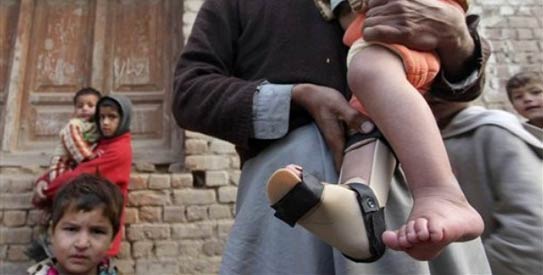KARACHI: About 94,000 children up to five years of age in the city could not be vaccinated against the dreaded poliovirus, which infected nine children belonging to six towns of Karachi in 2011.
According to an independent coverage survey pertaining to the last polio vaccination campaign in Sindh, conducted from Jan 30 to Feb 1, although the overall coverage rate in the province increased by one per cent, Karachi failed to improve its coverage.
The latest report recorded the overall coverage of children by finger marking as 98pc, while Karachi remained static at 96pc. The coverage survey is normally conducted soon after the campaign to have immediate follow-up vaccinations known as sweeping.
In Karachi about 2.34 million of the target children, those up to the age of five years, live in Gulberg, SITE and Malir towns and while all of them were reached in the vaccination round of October 2011, this time around the vaccination drive was not as successful. Only 78pc of children could be covered in Gulberg, while the rate for SITE and Malir came to 96pc and 97pc, respectively. Town health officers, union council supervisors, polio vaccinators and volunteers in Landhi, however, achieved 100pc coverage target this time.
According to experts, normally a coverage rate above 95pc is considered commendable and a safe level as far as control of polio is considered. In Karachi, aside from Gulberg, there were three more towns Liaquatabad, Orangi and North Karachi, which could only cover 93pc, 94pc and 95pc of the children.
All over Sindh, which reported 33 new polio cases in 2011, 7.5 million children in total were supposed to be vaccinated against polio during the latest national supplemental campaign held in January-February 2012. None of the districts, excluding some in Karachi, could show 100pc coverage of children.
The coverage rate in Umerkot, Ghotki, Nawabshah, Naushahro Feroze and Kambar districts came to 99pc. In other districts the coverage rate ranged from 97pc to 98pc.
The reasons behind the missed children as per the report, which has been circulated among health officials as well, also included non-availability of polio teams. About 26pc of the missed children in Karachi could not be reached due to non-availability of vaccination teams, while 45pc were not found when the polio team visited their residences and another 26pc refused to accept the anti-polio oral drops.
Field staffers and health officers concerned said that the latest requirements with regard to monitoring, evaluation and formation of vaccinator teams in line with the Augmented National Emergency Action Plan 2012.
Requesting anonymity, a source in the health sector said that the change in post survey procedures had also led to confusion.
Furthermore, conditions like having to ensure at least one lady vaccinator/volunteer in every team has also doubled the task of the supervisors and health officers, as ensuring the appointment of women field workers in every team has not been possible in many towns, the official added.
It was further said that the threat of postponement of the campaign due to inadequate preparation at UC level and failure to attract government employees, particularly from the education sector, as well as women, has negatively impacted the polio campaign. This time many new faces with no field experience had to be included, said another officer.
However, a couple of monitors said that teachers from government schools who were involved in the last vaccination campaign were not up to the mark, while older ones were not effective due to their inadequate mobility.
One official disclosed that some people were not willing to share family details with the teams after hearing about the doctor in Abbottabad who pretended to be a polio vaccinator while working for an intelligence agency to apprehend Osama bin Laden.
A female worker in Gulberg town said that they had been trying their level best to convince parents about the efficacy of the polio vaccines, but “parents in big bungalows or those living in high-rises flatly refused, saying that they had already got their children under five vaccinated by their pediatricians.”
According to Prof Iqbal Memon, a senior pediatrician and polio activist, there was a need to promote correct facts about polio drops. Polio drops have effectively eliminated the menace of polio in many parts of the world, he said, adding that the media should take extra care while debating the efficacy of polio vaccines.











































Dear visitor, the comments section is undergoing an overhaul and will return soon.